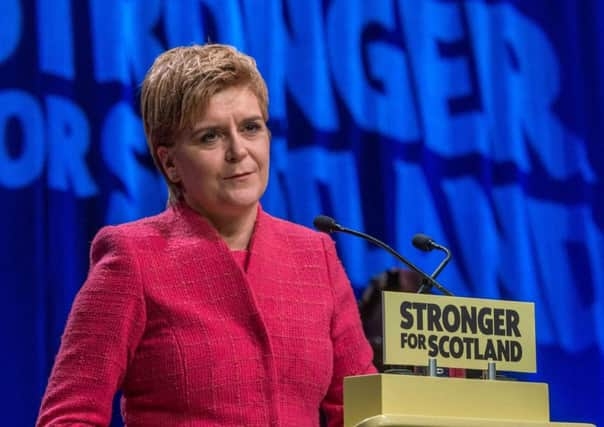Tom Peterkin: Sturgeon faces fundamental difficulties on indyref2


Nicola Sturgeon’s spokesman has said it is “likely” she’ll disclose what she intends to do about a second independence referendum before Holyrood rises for the summer recess at the end of next week.
When that moment arrives at some point over the next few days, it promises to be a pivotal one for the First Minister.
Advertisement
Hide AdAdvertisement
Hide AdAs things stand it is difficult to see quite how Ms Sturgeon can extricate herself from the spot between a rock and a hard place where she finds herself having reacted to Brexit by putting indyref2 at the top of her agenda.
In the aftermath of a poor election for the SNP, Ms Sturgeon has acknowledged that talking up another vote cost her during a contest that saw her party lose 21 seats.
That setback saw her promise to reflect on the SNP’s position and it is the outcome of those reflections that the nation awaits now.
Given the ground lost by the SNP, there can be no doubt that being so gung-ho about another vote was a hugely damaging misjudgment. Indeed, it was hurting the SNP so badly that there were various attempts to back track during the election campaign. But by then it was too late.
The misjudgment had its roots in the way the SNP responded to the outcome of the 2014 independence referendum – despite losing, the Nationalist movement reacted as if it had won.
Despite the Yes support trailing No support by 383,937 votes, little or no effort has been made to understand why the SNP’s proposition was rejected at the polls.
Instead, Ms Sturgeon embarked on a series of rallies, where she posed for selfies with her Saltire-waving supporters and was lauded by those who were already converts to the independence cause.
That sense of triumph was exacerbated by the remarkable general election result of 2015 which saw the Yes vote coalesce behind the SNP and saw the Nationalists capture 56 out of 59 Scottish seats.
Advertisement
Hide AdAdvertisement
Hide AdMeanwhile, those in SNP high command were too busy patting themselves on the back to turn their attention to working out why their independence proposition was unpalatable to the majority of Scottish voters.
Had Ms Sturgeon and co done this work, then perhaps she would have a little more insight into their opponents’ attitudes towards independence.
The First Minister’s mistake was to assume that a large proportion of the electorate would share her analysis that Brexit would ramp up demand for independence. Instead, she has discovered the hard way that her belief that a second independence referendum is the solution to Brexit is far from universally shared.
For a whole host of reasons, a large section of the Scottish electorate did not see the answer to a divisive and angry referendum on EU withdrawal as re-running a divisive and angry referendum on Scottish independence.
Had a post mortem examination been conducted into the 2014 result, it may have been discovered that large swathes of the electorate disagree with the SNP’s default position, which is to see everything in terms of the battle for independence. Having pursued a second indyvote with such alacrity, it will be interesting to see where Ms Sturgeon goes now.
The only route that will satisfy Ruth Davidson and her emboldened Scottish Conservatives is for Ms Sturgeon to ditch her plans altogether.
That, however, is clearly not an option for a party for whom support for independence is an article of faith. A U-turn of such screeching ferocity would alienate SNP supporters, would be personally humiliating and would hand a victory to the Tories.
Alternatively, Ms Sturgeon could stand firm and continue agitating for another referendum – sticking to her line that winning a Scottish majority at Westminster reinforced her indyref mandate. That approach has already proved unsuccessful.
Advertisement
Hide AdAdvertisement
Hide AdTherefore when Ms Sturgeon gets round to revealing her thoughts on this tricky issue, one suspects her answer will be one in the long tradition of political fudges. Ms Sturgeon does have form when it comes to back-tracking. She has already conceded that her preferred timetable to hold a independence vote by spring 2019 could slip.
If past behaviour is any guide, she could seek solace in the EU withdrawal negotiations by softening the independence rhetoric and talking up the need to work for a soft Brexit. Over the coming months we can expect Ms Sturgeon to refer back to the Scottish Government’s “Scotland’s Place in Europe” document published at the end of last year which focussed on protecting Scotland’s relationship with the EU.
There may also be the opportunity to move the constitutional sabre-rattling away from indyref on to the repatriation of powers from Brussels. While the prospect of the Great Repeal Bill being subject to a legislative consent motion in the Scottish Parliament opens up a front in another constitutional battle.
Exploiting the Brexit negotiations while keeping indyref as an “option” – should Brexit foul up – is likely to be the approach.
Of course, failure to remove indyref from the table will mean Ms Sturgeon will still be vulnerable to Conservative accusations of being indy-obsessed. Meanwhile a more fundamental problem remains – her failure to convince the wider electorate of the attractions of Scottish independence.